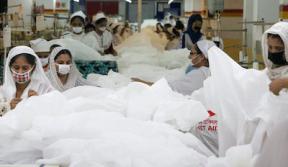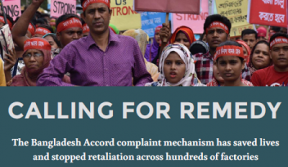Following the recent tragedies in Bangladesh’s garment factories where more than a thousand workers were killed, labor groups urged the clothing retailer American Eagle Outfitters to sign on to the Accord on Fire and Building Safety in Bangladesh. UNITE HERE, the labor union representing textile and hospitality workers throughout North America, collected approximately 12,000 petitions and distributed handbills at 40 American Eagle stores over the past month in an effort to urge American Eagle to join the Accord.
Today American Eagle announced that the company has signed on to the Accord, joining this historic effort to improve workplace safety in the troubled Bangladeshi garment industry. Global Union Federations IndustriALL and UNI worked with companies and NGOs to draft the Accord and convened companies and unions as signatories; UNITE HERE is an affiliate of both IndustriALL and UNI. American Eagle did not source from the factories where the calamities occurred, but as a significant buyer of Bangladeshi apparel, the company can play an important role in protecting worker safety and preventing future tragedies. Today, students, labor rights advocates and UNITE HERE members are joined by Amirul Haque Amin, President of the National Garment Workers Federation (NGWF) of Bangladesh, to celebrate this victory and discus next steps in the effort to expand the Accord to other retailers. Visiting New York on a US tour coordinated by the International Labor Rights Forum (ILRF), Mr. Amin is calling for more US brands and retailers to join the Accord to improve conditions in the Bangladesh garment industry.
“It's an exciting day for garment workers in Bangladesh and throughout the world. I'm looking forward to harnessing the energy of this victory and continuing to fight for workers’ rights abroad and here at home too," said Mike Stivers, a junior at the City University of New York’s Hunter College, who was part of the efforts to collect petitions urging American Eagle to join the Accord.
Among NGWF’s membership were workers in the Rana Plaza building collapse, which killed 1,129 workers on April 24th. Following this tragedy, the NGWF has waged protests calling for full and fair compensation for the injured workers, as well as for the families of workers who were killed, and demanding that multinational companies buying apparel from Bangladesh join the Accord on Fire and Building Safety.
This week a group of 17 North American retailers, including Wal-Mart, Gap, Target, Macy’s, and Nordstrom, announced a much weaker, alternative plan to address building and fire safety in Bangladesh that has been described by the International Labor Rights Forum as a "corporate-run factory auditing scheme, another in the long series of ineffective corporate auditing programs that these companies have touted for years." The AFL-CIO and Change to Win Federation described the alternative plan as a "watered-down and unenforceable version of the Accord for those companies that would prefer not to make a serious commitment to worker’s rights." Labor rights advocates view American Eagle's move to join the binding, original Accord as an encouraging sign that more US retailers will join this more substantive plan to improve factory conditions in Bangladesh and prevent catastrophes like the collapse at Rana Plaza and the November 2012 Tazreen factory fire from ever happening again.

